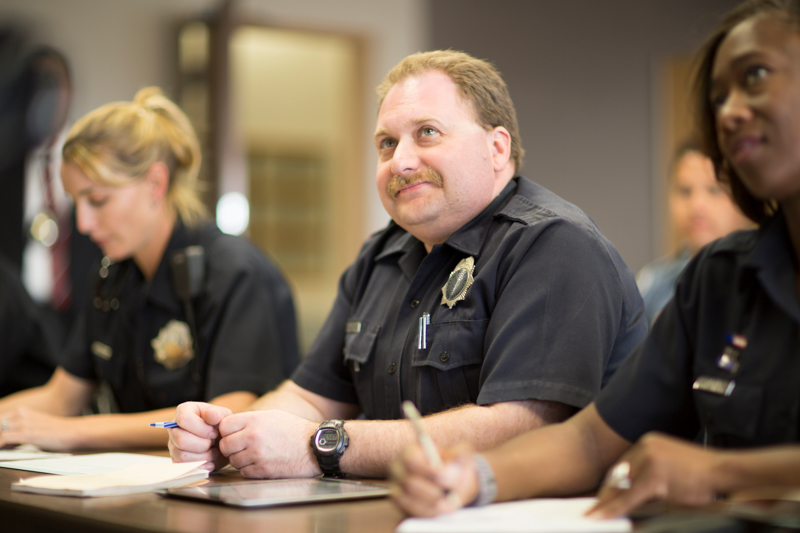I have been teaching/instructing firearms and use of lethal force professionally since I was 23 years old, and it has been my full time occupation since about 1982. Early in every shooting class I run I ask the class, “How many of you are instructors in this?” In all but the dedicated instructor class, only a few hands rise. Then I ask, “How many of you share your knowledge with people you care about?” and virtually all the hands go up. I then remind them that if they raised their hands that second time, they DO teach/instruct in the discipline, and the only difference between those who raised their hands the first time and the second is student volume, one line on a business card, and another line on a W-9 form.
When we share knowledge, we have the ethical responsibility of sharing it correctly and effectively.
Let me introduce you to Suzi Huntington. She is a retired career cop and shooting incident winner from the San Diego Police Department, and the former editor of American Cop magazine. I’ve seen her shoot, and have had to shoot against her in competition, and am here to tell you she’s damn good at what she does. Some of you may be more familiar with her husband, Roy Huntington, the editor emeritus of American Handgunner magazine and another honorably retired SDPD cop.
I’d like to share with you an excellent article Suzi Huntington wrote recently for American Cop. I think she’s very much on point, whether you see yourself as “teacher” or “instructor.” Thanks, Suzi.



Lotta good points there. I can still recall ins…….teachers who’d cover some technique-use of a flash light (before WMLs) & long gun comes to mind-and then ask the class if they had any practices they’d found good. One of the major benefits of classes where there are folks from different areas/entities is that you can sometimes learn much from your fellow students.
Obviously, this isn’t necessarily true when covering fundamentals for those new to the subject. It can also become a challenge when running “old dogs” through yet another recertification. My last “instructor” recert was quite memorable-in a good way.
I distinctly recall that part of my MAG40 class when you instructed us to go out and give good instruction whether it was to friends, family or the online forums. Being surrounded by people with good information is ideal. Those who cannot or will not embrace best practices are those I distance myself from. I’ll always be an instructor as well as a student of the art. Thanks Mas. 🪨
Everyone teaches us something. Some teach us how to. Others teach us how not to. Learn from both.
The opposite is also true. Each time we have a gun in public we teach, whether we intend to or not. Make sure you teach how to, instead of how not to.
I agree with the article, but some subjects are more fascinating than others. It should be easy to hold students’ attention when teaching firearms. Even people who don’t like them are fascinated by them. On the other hand, imagine a teacher tasked with teaching a class on opera to non-music majors. Imagine the teacher has taught the same course every semester for twenty years. Both the professor and the students may have a difficult time getting enthusiastic about that subject.
I recall a college professor who passed on a great quip: “Lecture is a method a passing information from the notes of the lecturer to those of the student without it passing through the minds of either.” I can still recall a poor soul drafted to make a (poorly done by someone else who didn’t really know the subject) Power Point presentation who neither reviewed the material before hand nor researched the detail of what a couple of points were supposed to cover.
Something to keep in mind when crafting lesson plans-if you’re that organized/regimented. Power Point can be a great tool, but don’t depend upon one sentence to spark the entire train of thought.
There’s a lot of truth in that quip, at least for me personally. In my history classes (I was not a history major nor much interested at the time — unlike now), I’d commit myself to taking notes on the lecture, and lose myself in that.
After class, I’d have 5-6 pages of notes, none of which I recalled taking. Only when reviewing them in depth could I remember writing those words. Apparently my active mind shut off during lectures and my note-taking hand just did its thing. But they were good notes, and reviewing them helped me learn the material and do well on tests and projects.
It’s just interesting that I wrote down so much without thought or even memory of writing it.
Introspection provoking article. Seems to me that nearly every LE only qual and, to a lesser extent, training classes have been a nightmare for me. Similar issues whenever I’ve went out with some national guard. This has been my personal experience, not intending to cast any aspersions. It’s just that participation trophy phenomenon that happens in bureaucracy where they get you j-uuuuust proficient enough to get yourself killed. I forget who said the quote “a little bit of knowledge is a dangerous thing”, but they were right.
Best classes I’ve been to are MAG though, aside from the occasional “training tourist”, everyone just really wants to be there. Mas offers opportunities to assist during range time for his students so you don’t hear anyone pining to throw in their opinions at every break, i think that helps to coalesce the spectrum of attendees and keeps cliques from forming. You know you’re somewhere worthwhile when the professionals are cheering on the newbies like parents at a little league game.
Comments are closed.